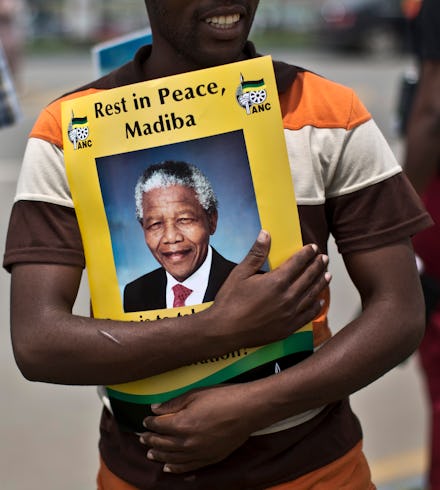How African Millennials Can Carry On Nelson Mandela's Legacy

As Nelson Mandela's coffin was lowered into the ground today in his hometown of Qunu, the immensity of our loss finally began to sink in. From the scale, the depth of emotion, and the sheer volume of the Mandela tributes over the last few days, it is clear that the grief over Mandela's passing is felt the world over. Arguably however, the pain may be deepest here, in Africa.
Mandela was our hero, the greatest we have produced this century. For millennials in South Africa and across the continent, his passing is particularly painful. Mandela was the only great African liberator whose story we were able to actually witness. We were born at the tail end of his struggle and we were probably too young to process what we were witnessing. However, we grew older and we understood. We read his books, we heard him speak, and we understood how blessed we were to have walked this earth at the same time as Madiba.
For those of us who will make up the new crop of African leaders and be responsible for carrying on Mandela's legacy, this is the time to take stock and decide how best to honor him. Here are a few places where we can start:
Keep Fighting For Equality
Mandela devoted his life to overcoming racial inequality in South Africa. Following his presidency, he was criticized (perhaps unfairly) for not doing enough to address the social and economic inequality which remained. This is our battle. The scourge of apartheid is no more. However, the white upper class in South Africa has only been expanded to include a small group of wealthy black South Africans. Millions of (mostly black) South Africans continue to live in poverty. The same is true across the continent. While GDP continues to rise continent-wide in places like Nigeria and Angola, the gap between the rich and the poor is getting wider. It falls to our generation to close this gap. We need to rise to the task with the same devotion with which Mandela fought apartheid.
Put the Nation First
There is perhaps no greater example of patriotism than Madiba. It is an example to which we must all aspire if Africa is to reach its potential in the coming decades. Love for the country above all others will help us prevent many of the shortcomings that plagued our predecessors. A public official who loves his or her country does not take a bribe. A disgruntled opposition leader who loves his or her country does not stage a coup. A young person who loves his or her country will continue to work to improve it, even when it seems like an impossible task.
Work With People You Disagree With
In collaborating with F. W. De Klerk to bring an end to apartheid, Mandela did much more than "reach across the aisle." He had to befriend and gain the trust of a man who embodied many of the things he had fought against his entire life. His decision to open negotiations with the government was met with suspicion from both the other side, and from members within his own party. Yet Mandela was able to look beyond the skin, the beliefs, and the actions of the men sitting across from him at the conference table, and saw instead the opportunity that they presented — the creation of "the Rainbow Nation" with as little bloodshed as possible.
Across the continent, countries are becoming increasingly divided over ideology, party, or ethnicity. The competition for power becomes a zero sum game where the success of one party means the failure of another. In light of Madiba's example, these divisions appear almost laughable. Like Mandela, we must be prepared to set aside ethnic, religious, or ideological affiliations and cooperate with all stakeholders in the advancement of our nations and our continent. This is a lesson which is instructive not only for millennials in Africa, but also for young people in the United States, currently burdened with an obstructionist, deeply divided, and counterproductive Congress.
Maintain an International Perspective
The campaign to divest from apartheid South Africa was one of the greatest examples of international cooperation in recent memory. Mandela credited the divestment campaign for driving a "stake through the heart of apartheid." These days, the mantra of African Solutions to African Problems (while laudable) often prevents African leaders from effectively engaging the international community in mutually beneficial ways. One area where international cooperation is particularly important is in stemming the tide of illicit financial flows from the continent. The Guardian reports, "Developing countries are losing more than $1tn (£614bn) a year in 'illicit financial flows' … 10 times the total amount of foreign aid these countries are receiving."
These funds, once they leave the continent, are held in accounts across the globe. The money is re-invested, transferred, and integrated into the global economy. It may take an effort on par with the international divestment campaign to stop the bleeding and keep valuable resources in the countries where they are most needed.
Know When to Let Go
When Madiba, having served just one term as South Africa's first black President, decided to step down, he again taught us a valuable lesson. His selfless act stands in sharp contrast to the actions of Big Men across the continent, who have gone to absurd lengths to maintain their hold on power, including constitutional changes, voter intimidation, and political assassinations. Our generation cannot continue this trend. In the presence of strong men, the strong institutions we desperately need cannot grow.
Mandela's long walk to freedom may be at an end, but ours is just beginning. We can follow the path he laid out for us, and only hope that our steps one day mirror his.